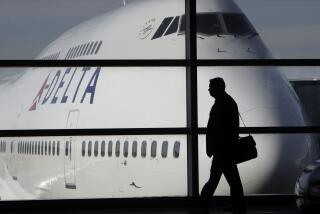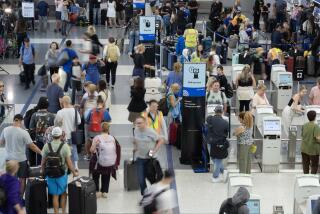Airlines Try to Bridge the Credibility Gap
- Share via
On Monday, May 10, at 1:45 p.m. in Las Vegas, I came face to face with the greatest problem confronting the airline industry.
Departure time had passed for a packed Southwest Airlines flight to Burbank when the pilot made an announcement: There would be a delay because “we’re holding for transfer passengers.” My suspicions rose immediately. Southwest doesn’t hold for connecting passengers, especially on a shuttle service such as Las Vegas-Burbank. Something else must be wrong.
Almost everyone on the left side of the Boeing 737 was ready to disbelieve the pilot, even if they didn’t know Southwest’s policies. An air-conditioning generator was dragged up on the left side to try to cool the hot plane. “Oh, that must be the problem,” said one passenger, gazing down at the contraption, and others nodded in agreement. As the generator itself broke down, a knowledgeable passenger assured them that this was an attempted solution, not a problem. But it was clear they were ready to believe that the pilot wasn’t giving them the straight story.
Thirty minutes later, the real reason for the delay came bounding through the door--a young woman in a flight attendant’s uniform. The door shut immediately, push-back began and the lead flight attendant announced: “Folks, this is Kimberly. Because of her, the plane can leave now.”
This was no transfer passenger. The plane was short a flight attendant because the scheduled attendant had been delayed elsewhere by weather, and Southwest located Kimberly halfway through a sandwich in a McCarran International Airport restaurant.
People don’t believe airlines, especially when airline personnel give excuses for delays and cancellations. Outright lies are rare in air travel. But a majority of passengers I talked to seem to accept the premise that lies are routine.
Capt. Mike Senior, Delta’s system manager of operations services, said focus groups express the point strongly. “That comes through loud and clear: ‘You’re lying to us,’ ” Senior said.
Misinformation is not rare, however, often because airlines have done a poor job of directing information to harried gate agents.
“A lot of our agents have the same frustration,” said Mark DuPont, managing director of customer services for American Airlines.
Sometimes it appears that a few pilots and gate agents shade the truth to make their jobs easier or to calm passengers. But most pilots and gate agents attempt to give the truth to passengers, to the extent they know it and believe it won’t unnecessarily frighten anyone. Three days after my Las Vegas experience, another Southwest pilot did the best job I have ever heard in explaining why landings in St. Louis were slowed.
Misrepresentations, deliberate or not, often slip past unnoticed. But when they are found out, passengers have yet another story for their friends. And a little more trust is lost.
Even top Federal Aviation Administration officials aren’t immune. Administrator Jane Garvey has told friends that she was puzzled to hear a US Airways pilot tell her and other passengers that their Washington-to-Boston flight on May 23 was delayed on the ground because the air traffic control system was doing “Y2K testing.” Wondering why no one had told her, Garvey used a seat-back phone to call her command center.
Nope, there was no Y2K testing anywhere in the country, she was told.
Word of Garvey’s call obviously got back to the airport. Within two minutes, the plane moved to the end of the runway and took off.
While not directly addressing that incident, Lawrence Nagin, US Airways’ executive vice president for corporate affairs and general counsel, said, “All of us must be appropriate and accurate in talking to our customers.”
The lack of trust is a key element of the “passenger bill of rights” proposals. The trigger event for the legislation was a snowstorm in Detroit in January, when passengers were stranded on runways and taxiways for up to eight hours in whiteout conditions. Roads also were closed, so not enough employees could get to work to clear gates and get passengers off.
Almost every major airline is already making plans to enhance the flow of accurate information to passengers. Individual solutions appear to follow the personality and resources of the airline.
TWA, still a money-losing carrier, decided on a low-budget, human approach. The airline established a Flight Information Control office, where only the manager on duty can make the final decision on cancellations. Two airport operations managers per shift at Lambert-St. Louis International Airport then are in charge of getting full and accurate information to gate agents.
Delta, on the other hand, is totally revamping its operations information system to give everyone, including gate agents, full information. Delta had identified a confusing jumble of seven different flows of information through the company, and gate agents often had to get by with only a basic flight advisory message, which just says that a flight is delayed or canceled but gives no full explanation. “The flight advisory message hasn’t changed in 35 years,” a Delta official said.
US Airways has appointed a director of consumer advocacy, Donna Paladini, to gather feedback from customers and employees and to ride planes as a fare-paying passenger to observe problems. She reports directly to President Rakesh Gangwal.
American will soon experiment with a party-line radio frequency at each gate at Dallas-Fort Worth International Airport, which can be used by everyone from pilots to baggage handlers.
United is experimenting at one Chicago gate with a new type of message board called “the Word.” This lighted board will eventually be programmed to cull information from several computer systems and automatically display it.
Southwest and Continental say they have no fancy new technology. Instead, they say they are concentrating on a happy work force that will be free to glean information from mechanics or dispatchers. “You know how you really get to the heart of the problem?” said Continental President Greg Brenneman. “Do you have employees who like coming to work?”
*
Times Travel Writer Christopher Reynolds is on vacation.
More to Read
Sign up for The Wild
We’ll help you find the best places to hike, bike and run, as well as the perfect silent spots for meditation and yoga.
You may occasionally receive promotional content from the Los Angeles Times.






